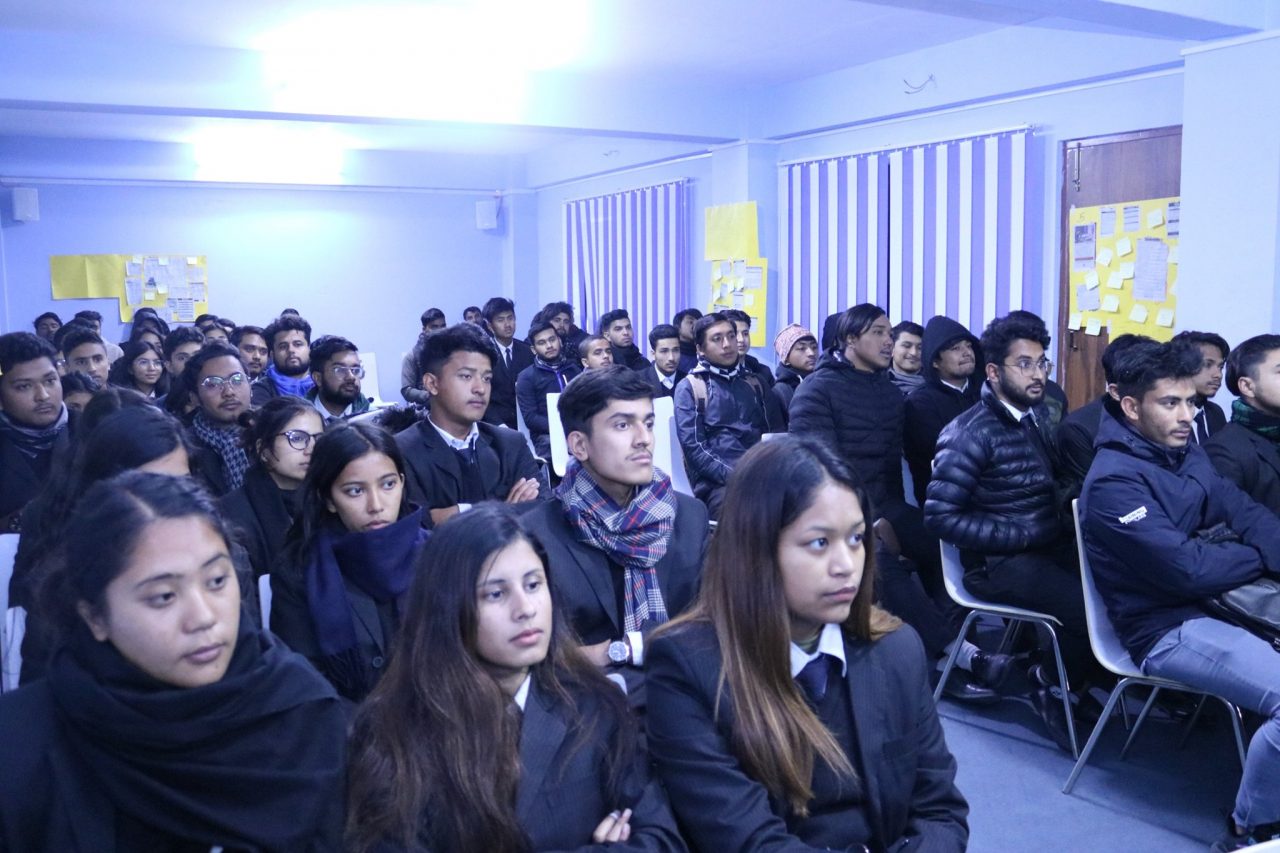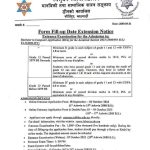-
Table of Contents
BBS College in Nepal
The objective of the BBS College program is to develop students into competent managers for any sector of organized activity. The BBS Academic Programme is based on the principle that graduates will spend a major portion of their life in a constantly changing environment. Therefore, the student should have an opportunity to obtain a broad knowledge of the concepts and reality-based skills underlying the operation and management of organizations. Students looking for top management colleges and BBS college in Bhaktapur, Kathmandu Valley and all over Nepal usually join Samriddhi College.
Our Next Program: BSW Course in Nepal
Career and Job Opportunities after BBS Course
Samriddhi College is one of the best BBS College in Bhaktapur, Kathmandu Valley, and all over Nepal. The course Structure of BBS College provides a strong foundation in applied areas of business. This bbs course highlights the importance and appreciation for the diversity and inter-relationship of business and management issues. It furnishes opportunities to choose any management sector and specialization courses to provide a degree of functional expertise.
Upon graduation, a student should be equipped to function as a manager in business, industry, and government. The bbs graduates students should also have a variety of career and job opportunities in different sectors of business including entrepreneurship and create much-needed jobs for others.
Our Next Program: BCA Course in Kathmandu

Program Objectives of BBS College
The BBS program especially attempts to:
- Equip the students with the required conceptual knowledge of business and administration to develop a general management perspective in them.
- Develop required attitudes, abilities, and practical skills in students, which constitute a foundation for their growth into competent and responsible business managers.
- Encourage entrepreneurial capabilities in students to make them effective change agents in the Nepalese society.
- Develop a necessary foundation for higher studies in management and thereafter take up careers in teaching, research, and consultancy.
Course Features at Samriddhi College
- Internship Facility in different organizations.
- Well experienced faculty members
- Excellent Academic Results
- Accounting Package ( Microsoft Word, Microsoft Excel, Microsoft PowerPoint)
- Soft Skill Classes (Presentation Skills, Report Writing, Seminar, Workshop, Guest Lectures, etc.)
- Industrial Field Visits
- Job placement through “Placement Cell”
- Merit-based scholarship in internal and final examinations
- Promoting entrepreneurs through “Incubation Center” and “Skill Lab”
- Guest Lecture sessions from experts
- Workshop and seminar by professionals
- Different skill sets training to students through Project-based Learning
Eligibility Conditions for Admission of BBS Course
The candidate applying for admission to the BBS program:
- Must have successfully completed the PCL or 10+2 in business/commerce or an equivalent course from a Higher Secondary School Board, or from Tribhuvan University, or from any other University/Board recognized by TU.
- Must have studied English as a full paper at the PC level or 10+2 program.
- Must have secured the minimum marks at the PC level or 10+2 program as prescribed by the Faculty Board or the campus concerned.
- Must satisfy any other entry requirements or criteria including the entrance test as prescribed by the Faculty Board or the campus.
Minimum General Requirements for BBS Course
The minimum general requirements for the 4-years BBS program are as follows:
- An academic year will consist of a minimum of 150 teaching days excluding the days taken for admission and annual examinations.
- The total instructional hours in an academic year will be 615 (150 days x 4:10 hours a day). For courses requiring field and practical works, additional hours of study will be required.
- There will be a minimum of five periods (i.e. class hours) each teaching day. The campuses running morning or evening shifts will also be required to meet this minimum class requirement.
Attendance, Evaluation, and Grading System
The final evaluation of students is done through the annual examination conducted by the Office of the Controller of Examinations, Tribhuvan University. However, for qualifying to appear in the annual examinations, students must meet the following requirements:
- The student must have a minimum of 70 percent attendance of the classes actually held.
- No student will be allowed to appear in the second year final examinations without first appearing in the first year final examinations.
The grading system in the annual examinations is as follows:
Third Division: 35%
Second Division: 45%
First Division: 60%
Distinction: 75%
Methods of Instruction
The campuses offering the BBS program should use the methods of instruction that help prepare the student for the realities of Nepalese business, industry, and government in which he/she has to work. A combination of lectures, group discussions, problem-solving exercises, guest lectures, practical work, and fieldwork will be used as approaches to learning. The campuses are also encouraged to use the case method of instruction whenever required and wherever possible.
BBS Curricular Structure
The curriculum for the BBS degree comprises four separate and distinct course components:
- A strong foundation in allied areas of business such as language, economic analysis, legal environment, quantitative methods and research methods to prepare graduates to understand, analyze and comprehend the management concepts, theories and practices.
- Core business studies encompassing and integrating all functional areas to provide graduates with an appreciation of the diversity and inter-relationship of business and management issues.
- The opportunity to concentrate in one area of specialization such as accounting, finance, human resources management, management science, and marketing in order to provide graduates with some degree of functional expertise.
-
The First Year Programme
The purpose of the first year programme is to build a strong foundation in students to prepare them to comprehend the business concepts, theories and practices. The first year programme is organized into the following compulsory and core courses:
First Year (500)
Course Code
Course Title
Full Marks
MGT 201
Business English
100
MGT 202
Business Statistics
100
MGT 203
Microeconomics
100
MGT 211
Accounting for Financial Analysis
100
MGT 213
Principles of Management
100
Total
500
-
The Second Year Programme
The purpose of the second year programme is to provide basic concepts, tools and understanding of the foundation and core courses. The foundations courses are required to develop understand business practices. The core courses provide essentials of learning which are basic in the broad area of business studies. The second-year programme is therefore organized into the following core and compulsory courses:
Second Year (500)
Course Code
Course Title
Full Marks
MGT 205
Business Communication
100
MGT 206
Macroeconomics
100
MGT 212
Cost and Management Accounting
100
MGT 214
Fundamentals of Marketing
100
MGT 216
Foundations of Human Resource Management
100
Total
500
-
The Third Year Programme
The purpose of the third year programme is to provide basic concepts, tools and understanding of the fundamentals of business studies. The core courses provide essentials of learning which are basic to understand broader area of business studies. The third programme is therefore organized into the following core and compulsory courses:
Third Year (500)
Course Code
Course Title
Full Marks
MGT 204
Business Law
100
MGT 215
Fundamentals of Financial Management
100
MGT 217
Business Environment and Strategy
100
MGT 218
Taxation and Auditing
100
MGT 219
Organizational Behavior
100
Total
500
-
The Fourth Year Programme
In fourth year, the students are encouraged to focus on a particular functional and concentration area of business studies. Building on the foundation laid in the first, second and third years, the principal mission of the fourth year twofold:
- To enable the students to concentrate in one functional areas of business. The four stream of concentration courses:
- Accounting
- Finance
- Management
- Marketing
- To provide opportunity to students to engage in research and final project presentation
Forurth Year (500)
Course Code
Course Title
Full Marks
MGT 220
Entrepreneurship and Enterprise Development
100
Concentration I
100
Concentration II
100
Concentration III
100
MGT 221
Business Research Methods
50
MGT 401
Final Project
50
Total
500
- To enable the students to concentrate in one functional areas of business. The four stream of concentration courses:
-
BBS Final Project Work
The education of future manager will be incomplete without exposure to organizational reality. Therefore, the final project work of bbs is made an essential academic requirement for the fourth year students in all concentration courses. To write a project work students will undergo a fieldwork and spend four weeks studying and learning from the organization during the time fixed by the campus/college.
After the bbs fieldwork, the student will write a project report on the format prescribed by the FOM and submit it to the college/campus for evaluation. The student may also be asked to present the report to the general class and/ or faculty members. The evaluation of the report will be made by a team of external and internal examiners appointed by the Research department of the respective campus/ college.
The bbs college project work should relate to the student’s specialization. The student must complete the prescribed number of hours of practical work in all courses requiring such work to the satisfaction of the concerned department. The final practical examination will be conducted jointly by a team of external and internal examiners appointed by the office of the controller of examinations.
A bbs student will have to pass the theoretical, practical and project work examinations separately in all the courses having theoretical, project work and or practical components.
-
Concentration
(Three courses from any one of the following five functional areas)
-
Accounting
Course Code
Course Title
Full Marks
ACC 250
Accounting for Banking
100
ACC 251
Accounting for Business
100
ACC 252
Advanced Financial Accounting
100
ACC 253
Advance Auditing
100
ACC 254
Budgeting and Controlling of Profit
100
-
Finance
Course Code
Course Title
Full Marks
FIN 250
Fundamentals of Corporate Finance
100
FIN 251
Commercial Bank Management
100
FIN 252
Foundations of Financial Institutions and Markets
100
FIN 253
Fundamentals of Investment
100
FIN 254
Insurance and Risk Management
100
-
Marketing
Course Code
Course Title
Full Marks
MKT 250
Fundamentals of Selling
100
MKT 251
Customer Relationship Management
100
MKT 252
Foreign Trade and Export Management in Nepal
100
MKT 253
Fundamentals of Advertising
100
MKT 254
Fundamentals of Services Marketing
100
-
Management
Course Code
Course Title
Full Marks
MGT 250
Entrepreneurship and Small Business Management
100
MGT 251
International Business
100
MGT 252
Management of Industrial Relations
100
MGT 253
Productivity Management
100
MGT 254
Quality Management
100

 Location:
Location:



